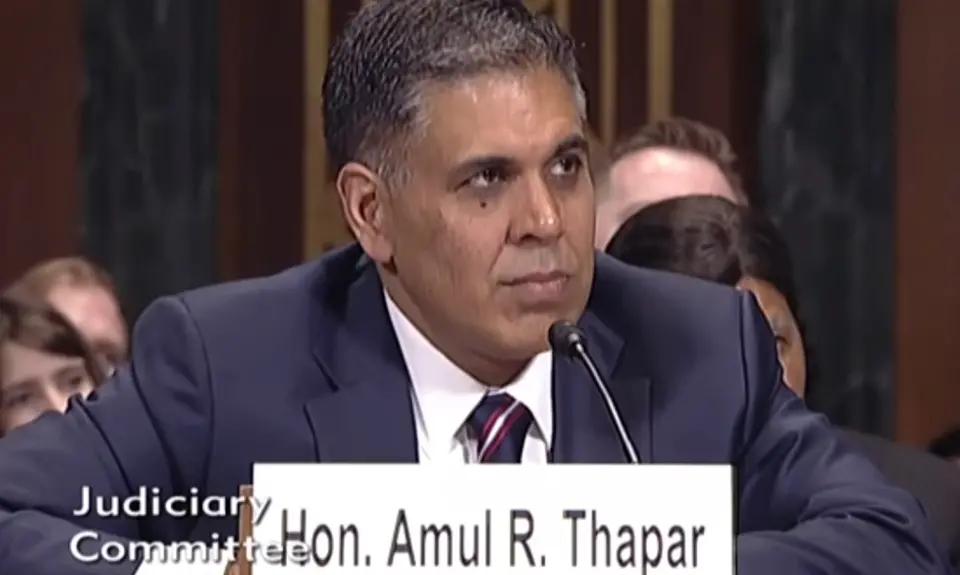“Confirmed Judges, Confirmed Fears” is a blog series documenting the harmful impact of President Trump’s judges on Americans’ rights and liberties. Cases in the series can be found by issue and by judge at this link
Trump Sixth Circuit Judge Amul Thapar wrote a decision upholding the dismissal of a deaf man’s complaint that a school district violated his rights under the Americans with Disabilities Act (ADA) when he was a student by failing to provide appropriate interpretation services, also harming the proper implementation of the ADA. The June 2021 decision was in Perez v Sturgis Pub. Schools.
Miguel Perez and his family emigrated from Mexico when he was nine and he started going to school in the Sturgis school district in Michigan. Because he was deaf, he was assigned a classroom aide to work with him, but the aide “was not trained to work with deaf students and did not know sign language.”
Despite the clearly inadequate services and education he received and his inability to communicate with others, Perez “appeared to progress academically” in school, getting good grades from teachers, and he and his parents “assumed he was on track to earn a high school diploma.” But “just months before graduation” from high school, Perez and his family were informed that he “did not qualify for a diploma” and could receive only a “certificate of completion” from high school.
Perez and his family filed an administrative complaint primarily under the Individuals with Disabilities Education Act (IDEA), contending that the district had failed to provide him with adequate educational opportunities. That administrative case was settled, with the district agreeing to pay for Perez to attend the Michigan School for the Deaf for compensatory education and for sign language instruction for Perez and his family.
Several months later, Perez and his family filed a separate lawsuit against the district under the ADA, seeking compensatory damages for emotional distress and other harm caused to him by the district’s discrimination against him on the grounds of disability during the years that he spent as a student in the school, when he was unable to communicate effectively with teachers, other staff, and other students. A district court dismissed the complaint without any discovery, and Perez and his family appealed.
Trump judge Thapar wrote a 2-1 ruling affirming the dismissal of Perez’s complaint. According to Thapar, the “crux” of Perez’s federal court complaint was that he was “denied an adequate education,” and therefore he was required to exhaust his administrative remedies under the IDEA before he could file a lawsuit, even though damages are not available under the IDEA. Because Perez and his family “settled his IDEA claim rather than continue to litigate it in the administrative forum,” Thapar went on, Perez “did not” exhaust his administrative remedies and his case should be dismissed. According to Thapar, this conclusion was “required by the text” of the relevant federal laws.
Judge Jane Stranch strongly dissented, raising serious concerns not only about Perez’s individual case but also about the proper interpretation of people’s rights under the ADA. As she explained, Thapar’s opinion “disfigures Perez’s allegations” in the federal court complaint, contrary to Supreme Court precedent. A review of the court complaint makes clear, she went on, that it was not taking issue with the district’s “failure to provide tailored educational services” as the IDEA administrative complaint did, but instead with its “failure to provide appropriate interpretation services” as required by the ADA, which “prevented him from communicating with anyone,” such as “classmates, coaches” and others as well as teachers, causing him harm under the ADA. As a result, Stranch continued, the decision “undermines Congress’ stated intent” to “reaffirm the viability” of the ADA and the IDEA as “separate vehicles for protecting” different aspects of “the rights of children with disabilities.”
As with a wheelchair-bound student in a comparable Supreme Court case, Stranch wrote, Perez’s ADA claim was not about “denial” of an appropriate education, but instead about discrimination and exclusion from all the “programs and services of his school.” Of course the absence of a qualified interpreter had “educational consequences” for Perez, just as the “lack of ramps” did for a wheelchair-bound student, but as the Supreme Court stated in that case, the “essence” of the claim concerns “equality of access to public facilities, not adequacy of special education.” Just as the Supreme Court ruled in the case of the wheelchair-bound student, Stranch explained, Perez’s federal court claim is not “subject to the exhaustion requirement” of the ADA, as previous appellate rulings had also held.
Stranch also pointed out that both the Supreme Court and most appellate courts had consistently held that students and parents may “bypass the [IDEA] administrative process where exhaustion would be futile or inadequate,” as in cases like this one where compensatory damages, which the IDEA does not provide, are “the only remedy capable of redressing” the injuries suffered. The result for students in the Sixth Circuit, Stranch went on, is to force them to choose between “immediately obtaining” appropriate education under the IDEA or “forgoing that education so they can enforce their ADA right of equal access.” That is “exactly the opposite of what Congress intended,” she continued, since Congress wanted to ensure the viability of both the IDEA and the ADA in “ensuring the rights” of children with disabilities. And by refusing to follow the Supreme Court’s ruling on exhaustion, Stranch concluded,” Thapar’s opinion improperly “has chosen to overrule from below a precedent of our Supreme Court.”
As a result of Thapar’s decision, therefore, Miguel Perez will be deprived of his rights to seek relief under the ADA, and other students with disabilities are threatened with harm as well. To help prevent such harm in future cases, it is critical to our fight for our courts that the Senate promptly confirm nominees by President Biden to the Sixth Circuit and elsewhere who respect disability rights and the laws Congress has passed to protect them.
